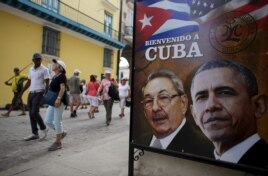20 March, 2016
President Barack Obama has arrived in Cuba, becoming the first American president to visit the island nation in almost 90 years while still in office.
Moments after the president's plane landed at Jose Marti airport in Havana in the rain, he sent a Tweet that said "¿Que bolá Cuba? Just touched down here, looking forward to meeting and hearing directly from the Cuban people." "¿Que bolá?" is an informal Cuban expression that means "How are you?"
Michelle Obama and their two daughters joined the president for the three-day-visit.

U.S. President Barack Obama and his wife Michelle approach Cuba's foreign minister Bruno Rodriguez as they arrive at Havana's international airport, March 20, 2016.
A new beginning
The president says the trip will be a new beginning in the relationship between the former Cold War enemies. At the State Department last week, he said "diplomacy -- including having the courage to turn a page on the failed policies of the past -- is how we've begun a new chapter of engagement with the people of Cuba."

Tourists pass by images of U.S. President Barack Obama and Cuban President
In Havana, workers put up American and Cuban flags along with a new coat of paint in Old Havana.
Cubans have eagerly awaited the president's visit as a sign of change for the country.
Yohana is a 45-year-old lab specialist in Havana. She says that the embargo has caused much damage to the Cuban health system. Jan Carlos, a 14-year-old student, hopes the visit will lead to improved communications between countries and better access to the internet and social media.
Hector Artigas is a 70-year-old retired worker in Havana. He says Cuban should be alert despite improved relations with the U.S.
Obama hopes his visit to Cuba this week will strengthen efforts between the two countries to improve their diplomatic and economic relations 55 years after they ended.
The two countries restarted diplomatic relations eight months ago.
Obama believes the restarting of relations with Cuba is one of the most important foreign policy decisions of his presidency. He has said that the policy of trying to isolate Cuba has failed.
Obama to meet Raul Castro and to address Cuban people
On Monday, the president is to meet with Cuban President Raul Castro. He will then meet with Cubans who are operating their own businesses to talk about economic ties between the U.S. and Cuba.
Tuesday morning, he will speak to the Cuban people on state-run television. He will tell them how he wants the relationship between the two countries to develop.
Ben Rhodes is the president's deputy national security advisor. He told reporters that the speech will also be a chance for the president to discuss the difficult history of relations between the United States and Cuba. Rhodes said the president will tell "how the United States and Cubans can work together (and) how the Cuban people can pursue a better life."
Obama will meet with human rights activists during his trip. The Cuban government opposes the meetings, but the Obama administration said it refused to negotiate with Cuban officials about who the president would meet and what they would talk about.
The Cuban government recently released some political prisoners and has let some people use the Internet. But in 2015, Human Rights Watch reported that Cuba "continues to rely on arbitrary detention to harass and intimidate individuals who exercise their fundamental rights." The rights group said detentions had increased since the two countries restarted diplomatic relations.
Continued opposition at home
Some of President Obama's political opponents also say Cuba is guilty of rights abuses. They have strongly criticized the president's visit to the Communist nation.
Representative Ed Royce is the chairman of the House Foreign Affairs Committee. In a statement, he said canceling the embargo "will further prop up a communist regime in Cuba that has a long record of brutal human rights abuses."
On Friday, Speaker of the House Paul Ryan said "this is a regime that provides safe harbor to terrorists and fugitives."
Because the president's political opponents control both the House and Senate, experts say it is not likely that Congress will approve the cancellation of the embargo.
But five Republican lawmakers are traveling to Cuba with Obama. And at least 15 Republican senators have said restrictions on travel to and trade with Cuba should be eased.
I'm Jonathan Evans.
VOA Correspondents Mary Alice Salinas, Kathryn Gypson and Michael Bowman contributed reporting. JC of the Havana Medical University contributed information from Havana. Christopher Jones-Cruise adapted the story for VOA Learning English. Hai Do was the editor.
We want to hear from you. Write to us in the Comments Section, or visit 51VOA.COM.
_____________________________________________________________
Words in This Story
turn a page on – expression to restart a relationship
chapter – n. a period of time that is very different from the period of time before it
engage – v. to become involved with (someone or something)
isolate – v. to put or keep (someone or something) in a place or situation that is separate from others
spur – v. to cause (something) to happen or to happen more quickly
pursue – v. to try to get or do (something) over a period of time
arbitrary – adj. done without concern for what is fair or right
harass – v. to annoy or bother (someone) in a constant or repeated way
intimidate – v. to make (someone) afraid
fundamental – adj. forming or relating to the most important part of something
regime – n. a form of government (usually negative)
safe harbor – expression a place of safety and comfort